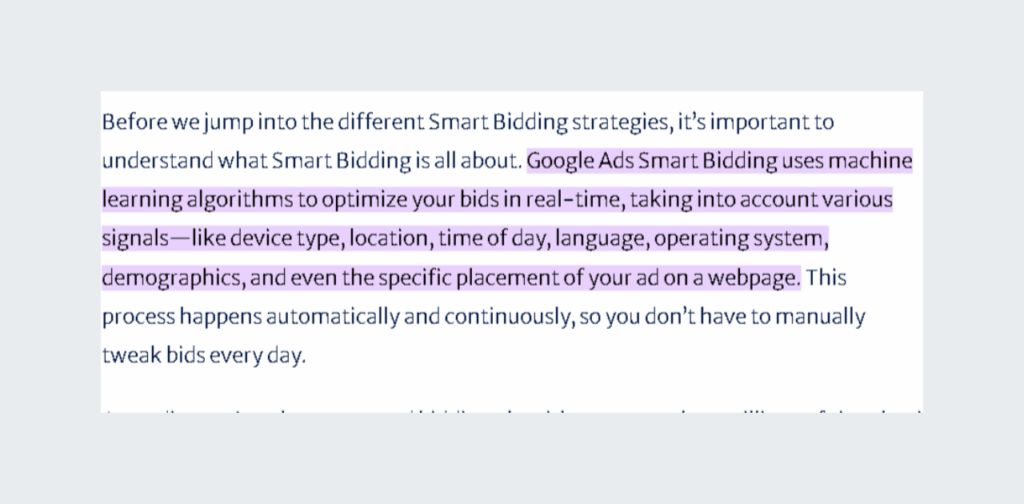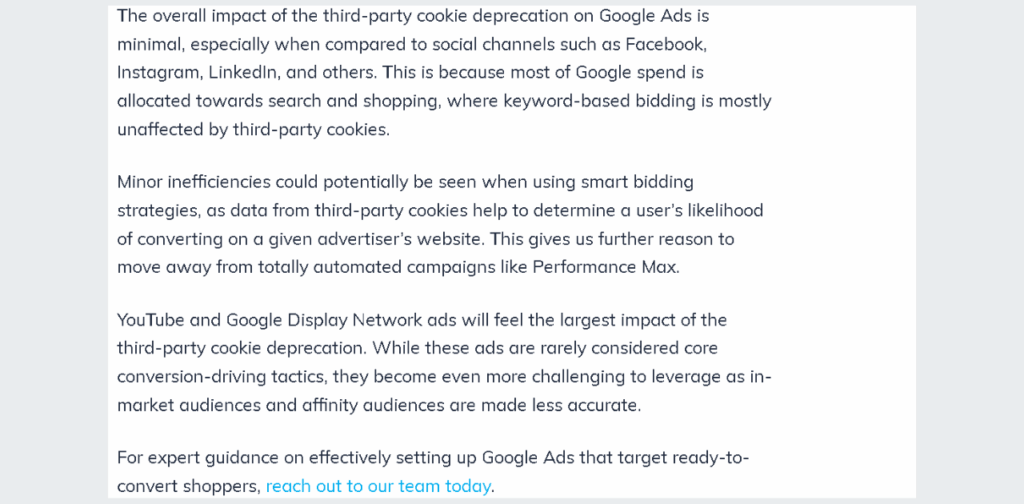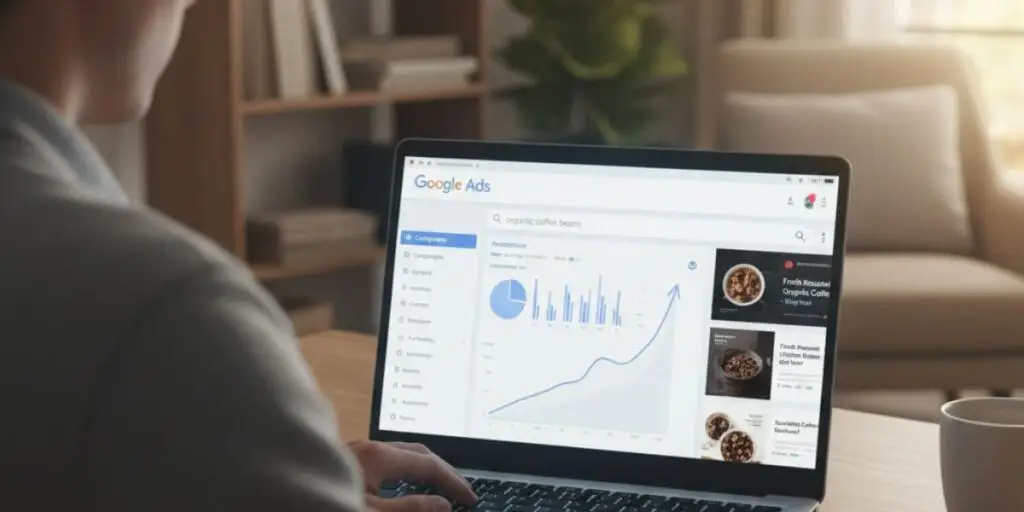1. Google Ads Smart Bidding Is the Growth Engine I Didn’t Know I Needed
I used to spend hours tweaking bids manually. It felt like a guessing game. I was paying for clicks that didn’t always turn into sales. The truth? Manual bidding was draining my budget and my time. I couldn’t keep up with the data. My competitors were running laps around me with less effort.
That’s when I discovered Google Ads Smart Bidding. It changed everything. Google Ads Smart Bidding is an automated way to set bids in Google Ads. It uses machine learning to get the best results based on real-time data. Think of it as a personal assistant that knows exactly when and how much to bid.
Since I switched, I’ve seen more conversions and better returns. And I spend less time inside the dashboard. Google reported a 20% increase in conversions for advertisers who use Smart Bidding.
2. What Is Google Ads Smart Bidding? (And Why It Works So Well)
Many small business owners hear about automation but don’t trust it. They want control. They want to manage every click. I was the same. But managing every click means you miss the bigger picture. It’s hard to make smart choices when you’re buried in data.
Google Ads Smart Bidding gives you the control you need with the performance you want. It uses machine learning to adjust your bids in real-time during every single auction. That means it reacts faster than any human ever could.
There are four main Smart Bidding strategies:
- Target CPA (Cost per Acquisition): Set your cost goal and let Google do the math.
- Target ROAS (Return on Ad Spend): Great for e-commerce. Google aims for the return you need.
- Maximize Conversions: Ideal when you want as many leads or sales as possible.
- Maximize Conversion Value: Focuses on getting the most value from your ad budget.
According to Google, Smart Bidding uses millions of signals at once including device, location, time of day, and more to make the smartest bid for every impression making sure that you get the best results.

How Google Ads Smart Bidding Works (The Simple Breakdown)
Google Ads can feel like a black box. You set bids and cross your fingers. You don’t always know what’s happening behind the scenes. Agitate: When things go wrong, it’s hard to fix them. If you don’t understand how the system makes decisions, it feels like you’re flying blind.
Let’s break it down simply. Google Ads Smart Bidding uses machine learning to set your bids based on real-time signals. This happens right at the moment someone searches.
What are these signals?
- Device type (mobile, desktop)
- Location
- Time of day
- Browser and operating system
- User behavior
- Language settings
- And many more
Google takes all these pieces and predicts which clicks are most likely to convert. Then it bids higher for those and lower for others.
Imagine a smart thermostat. It adjusts based on the weather, time, and your habits. Smart Bidding does the same with ads. Google processes over 70 million signals in one second. That’s way more than I could ever process by hands. With Google ads smart bidding, you can reach the right people at the right time. I get more leads without spending more.

Benefits of Google Ads Smart Bidding for Small Businesses
Running a small business means juggling everything marketing, sales, inventory, and customer service. Advertising often gets rushed or neglected. And when you don’t give your ads the attention they need, you waste money. You burn through your budget without seeing results. That’s frustrating.
Google Ads Smart Bidding gives small businesses like mine a chance to compete without needing a full-time PPC expert.
Here’s how it helps:
- Saves Time: No more guessing or daily bid tweaks. I set the strategy and let Smart Bidding optimize.
- Increases Conversions: Smart Bidding focuses on getting results, not just clicks. I’ve seen higher quality leads.
- Improves ROI: With better targeting, I spend less for better outcomes.
- Learns Over Time: The longer I use it, the smarter it gets. It adapts to what works.
- Easy to Adjust: If my goals change, I can quickly switch strategies—like from Target CPA to Maximize Conversion Value.
In a Google case study, small businesses using Smart Bidding saw up to 35% better performance than manual bidding. You will definitely sleep better knowing your ads are running efficiently without babysitting them.
3 Must-Know Success Factors in a Google Ads Auction
It’s easy to think success in Google Ads is just about having a big budget. But I learned it’s not that simple. Many small businesses waste money and still lose the auction.
Without knowing what Google actually looks at during auctions, you’re flying blind. You might have great ads but still get outbid or buried low on the page. Google uses key signals to decide who wins the ad auction. Here are the three factors that really matter:
1. Ad Rank
This is more than just your bid. It’s Google’s way of deciding where your ad appears (or if it appears at all). Ad Rank includes:
- Your bid amount
- Ad quality (expected click-through rate, relevance, landing page experience)
- Context of the search (user location, time, device, etc.)
- The impact of ad extensions (like call buttons, sitelinks)
Google says even if you bid high, poor ad quality can still drop your rank.
2. Expected Click-Through Rate (CTR)
CTR is a prediction. Google looks at past performance to guess if people will click your ad. If your ad looks relevant, you’ll get a boost.
- Write headlines that solve real problems
- Use strong calls to action
- Match your ads to searcher intent
3. Landing Page Experience
Once someone clicks, what happens? Google checks:
- Page speed
- Mobile responsiveness
- Message match between ad and page
- Whether the page answers the user’s query
Pages that load in under 3 seconds get a higher quality score and cost less per click.
You don’t need the biggest budget to win the ad auction. You just need a smarter strategy. That’s why Google Ads Smart Bidding works it builds these factors into its decision-making automatically.
Choosing the Right Google Ads Smart Bidding Strategy for Your Goals
I used to just guess which bidding strategy to use. I’d switch from Target CPA to Maximize Conversions without really knowing why. And yeah… my results were all over the place.
Picking the wrong strategy can hurt your performance. It’s like wearing running shoes to a formal dinner. Looks weird. Doesn’t fit. And it won’t help you win. Smart Bidding only works well if you match the strategy with your business goal. Here’s how I broke it down and got it right.
1st Goal: Get more leads?
Use Maximize Conversions. It spends your budget to get you as many conversions (sign-ups, leads, etc.) as possible. My Tip: This worked well when I launched a new service and just wanted leads, fast.
2nd Goal: Keep cost per lead low?
Go for Target CPA. You tell Google what a lead is worth to you, and it aims to hit that average.My Tip: This is my favorite for predictable costs. I just punch in KSh 500 per lead, and Smart Bidding does the rest.
3rd Goal: Sell products and make a return?
Use Target ROAS. If you sell online, this is gold. You set a return target, like 300%, and Google bids accordingly. Proof Point: After setting a 400% ROAS goal, my return jumped without increasing ad spend.
4th Goal: Get the most money back from your spend?
Pick Maximize Conversion Value. It finds high-value conversions even if you get fewer of them. Ideal when every sale isn’t equal.
Quick Table:
| Goal | Best Strategy |
|---|---|
| Leads fast | Maximize Conversions |
| Control cost per lead | Target CPA |
| High ROAS from sales | Target ROAS |
| Big ticket conversions | Maximize Conversion Value |
The bottom line is you don’t have to guess your way through placing Ads anymore. Pick the Smart Bidding strategy that fits your goal. You’ll stop wasting money and start seeing real results.
How Google Ads Smart Bidding Performs in a Privacy-Safe, Post-Cookie World

A lot is changing in digital marketing. Cookies are going away. Tracking is harder. And for small business owners like me, that felt scary.
Without third-party cookies, I thought I’d lose insights and my ads would flop. I couldn’t afford to waste money on guesses. I needed to know: will Smart Bidding still work? The good news? Google Ads Smart Bidding was built for this. It’s already designed to work in a privacy-first world.
Why It Still Works
Smart Bidding doesn’t rely heavily on third-party cookies. It uses first-party data (like actions on your site) and contextual signals (like time, device, location). That means it stays effective—even with stricter privacy rules. Google confirmed that Smart Bidding continues to deliver consistent results even with limited third-party tracking.
Real Privacy, Real Performance
When users choose not to share data, Smart Bidding fills the gaps with aggregated, anonymized signals. It keeps learning while respecting privacy.
Example: One of my landing pages stopped tracking conversions because of cookie consent banners. But Smart Bidding still optimized my ads based on session behavior and time of day. My performance barely dropped.
Why This Matters for Small Businesses
- You don’t need advanced tracking setups
- Your performance won’t die off as cookies disappear
- You stay compliant without sacrificing results
Bottom Line: Smart Bidding is future-proof. It adapts with Google’s privacy updates and keeps your business competitive even when other tracking tools fade away.
How to Increase Your Chances of Winning Ad Auctions with Google Ads Smart Bidding
At first, I thought Smart Bidding was a magic button. But my ads didn’t always rank high. I was losing auctions and leads.
The truth is, Smart Bidding helps. But if the rest of your setup is weak, you’ll still lose. Your ad copy, page quality, and setup all matter. A great bid can’t save a bad campaign. Here’s what I learned. To win more auctions, you need to support Smart Bidding with smart strategy. These tips made a real difference for my business:
1. Use High-Quality, Relevant Ads
Even with Smart Bidding, Google wants ads people love. Make sure your headlines match what users are searching for. Speak to their problem fast.
The Example i used “ When I changed my headline to “Get 2x More Leads in 7 Days,” my click-through rate jumped.”
2. Align Your Landing Page
Your landing page should match your ad promise. If someone clicks on “Free SEO Audit,” take them straight to that. Not your homepage. Google’s quality score improves when your page matches the ad. That helps your Ad Rank go up at a lower cost.
3. Use the Right Keywords
Smart Bidding helps with bidding but you still choose the keywords. Use intent-based terms like “affordable logo design Nairobi” instead of broad ones like “logo.” The tighter your targeting, the better Smart Bidding performs. Less waste. More wins.
4. Add Ad Extensions
Things like call buttons, links, and offers give your ad more space. They boost CTR and help you win the auction. You can try adding sitelinks with testimonials to see your ad move to the top spot same budget.
5. Give It Time to Learn
Smart Bidding uses machine learning. That means it needs data. Let it run for 1–2 weeks before making big changes.
Pro Tip: If results seem slow at first, be patient. Mine picked up strong after day 10.
Smart Bidding gives you the edge, but it’s not autopilot. When you support it with strong ad copy, landing pages, and keywords you’ll win more auctions, spend less, and grow faster.
The Core Benefit of Google Ads Automated Bidding (And Why It’s a Game-Changer)
Before I used Smart Bidding, I was in the weeds. I’d check my ads three times a day. I thought control meant success.
But I was just reacting. I wasn’t optimizing. My bids were emotional, not strategic. That kind of control? It was slowing me down and wasting my budget. The biggest benefit of Google Ads Smart Bidding is simple: it lets you stop guessing and start winning.
This isn’t just about automation. It’s about automation backed by machine learning, real-time data, and millions of micro-decisions I could never make on my own.
Why It’s a Game-Changer
- It frees you up to focus on strategy, not settings
- It finds patterns in your data you wouldn’t spot
- It adjusts instantly to trends, behaviors, and shifts in demand
- It learns faster the longer it runs, getting better over time
Google says Smart Bidding can analyze over 70 million signals in under a second. That’s like having a digital army optimizing every impression.
Real Talk from My Business
When I stopped micromanaging bids and trusted Smart Bidding, my leads went up. My costs went down. And I finally had time to work on my business, not just in it.
That’s the win. The real power of Google Ads Smart Bidding isn’t just better performance. It’s peace of mind. It’s knowing your ads are running smarter, even when you’re off the clock.
Final Thoughts: Why Google Ads Smart Bidding Is Non-Negotiable for Small Business Growth
Growing a small business today is tough. Competition’s high, budgets are tight, and customer behavior changes overnight. Manual bidding just can’t keep up.
Every wasted shilling on the wrong click hurts. Every hour spent guessing what bid to set is time not spent growing your brand, serving your customers, or closing deals. Google Ads Smart Bidding has changed how I run my business. It’s no longer about trying to outguess the algorithm—it’s about partnering with it.
When I let Smart Bidding take over, I finally had…
- Better results without burning out
- More time to focus on my customers
- Data-driven growth that actually scales
Key Takeaways:
- Smart Bidding doesn’t just save time it unlocks performance.
- It adapts faster than any human ever could.
- It keeps improving the more you use it.
- It gives small businesses a real shot at competing with big brands.
70%+ of Google Ads advertisers now use Smart Bidding. It’s not a trend. It’s the new standard.
My Final Word:
If you’re still doing manual bidding in 2025, you’re driving with a flat tire while everyone else is in Teslas. Smart Bidding is your business growth co-pilot. The sooner you embrace it, the faster you’ll get where you’re going.Learn more how AI is changing digital advertising.
What is Google Ads Smart Bidding in simple terms?
Is Smart Bidding better than manual bidding?
How does Google Ads Smart Bidding help small businesses?
What Smart Bidding strategy should I use?
Use Target CPA if you want control over cost per lead.
Use Target ROAS if you’re focused on e-commerce returns.
Use Maximize Conversion Value to attract big-ticket buyers.
Can Smart Bidding still work without third-party cookies?
What are the biggest mistakes people make with Smart Bidding?
Not giving it enough time to learn
Micromanaging bids after switching to Smart Bidding
Ignoring landing page experience and ad quality
